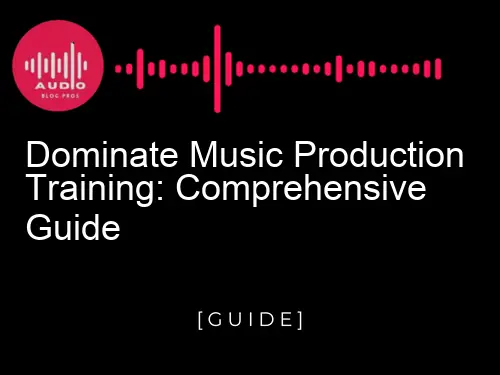Are you tired of feeling lost in the world of music production? Do you feel like there are endless resources, but none of them offer a comprehensive guide to truly dominate the craft? Look no further. In this blog post, we will delve into the secrets of music production training that will take your skills to the next level. Whether you’re a seasoned producer or just starting out, this guide will provide you with the tools and knowledge to crush your goals and dominate the music industry. Get ready to take your music production skills to new heights with our comprehensive guide.
Table of Contents
The Fundamentals of Music Production: What Every Beginner Should Know
Music production training can seem intimidating for beginners, but it doesn’t have to be. Understanding the fundamentals is crucial in building a strong foundation for your music career. Start with learning about sound and its properties such as frequency, amplitude, and waveform. Familiarize yourself with different recording techniques like microphones and room acoustics. Digital audio workstations (DAWs) are also essential tools in producing music, so take some time to explore and experiment with popular software like Ableton Live or Logic Pro X.
Understanding music theory is equally important when it comes to creating compelling tracks that connect with your listeners on an emotional level. Learning about chords, scales, melody structures will give you the necessary framework to create memorable hooks and progressions.
Take the time to familiarize yourself with all aspects of music production from both a technical standpoint as well as creatively through songwriting and composition strategies. With dedication and hard work, anyone can master this craft!

Choosing the Right Equipment for Your Home Studio
When setting up your home studio for music production, it’s important to choose the right equipment that fits your needs and budget. Audio interface is an essential tool that connects your computer to the rest of your gear, allowing you to capture audio signals from microphones, guitars, synthesizers and other sources. A good quality condenser microphone is also a must-have for recording vocals or acoustic instruments with accuracy and detail.
Investing in a set of quality headphones or monitors can make all the difference when mixing and mastering your tracks. Look for options that offer flat frequency response to ensure accurate sound reproduction. Having a MIDI controller can also be helpful for playing virtual instruments within a DAW (Digital Audio Workstation) like Ableton Live or Logic Pro X.
While having high-end gear can certainly improve your productions, it’s not necessary to break the bank in order to create professional-quality music. Ultimately, knowledge of how to use these tools effectively is what will allow you to achieve great results regardless of equipment limitations.

Essential Techniques for Mixing and Mastering Your Tracks
To make your tracks stand out, mixing and mastering are essential techniques that every music producer should master. Mixing involves balancing the levels of different elements in your track, such as vocals, drums, and synths, to create a cohesive sound. You can use EQ, compression, and other effects to shape the tone and dynamics of each element. Mastering is the final step in the production process, where you prepare your track for distribution by optimizing its loudness and clarity. You can use tools like multiband compression and limiting to achieve a professional-sounding final product. It’s important to note that mixing and mastering are separate processes that require different skills and tools. Don’t rush through these steps or skip them altogether – they can make or break the quality of your music production.
How to Create Captivating Beats and Rhythms in Your Productions
Creating captivating beats and rhythms is an essential aspect of music production. Drum programming plays a vital role in creating variations in the arrangement while maintaining consistency in the groove. To achieve this, producers use various techniques, including using different samples or synthesizing their drum sounds. Additionally, utilizing unique rhythmic patterns can help make your track stand out from others.
Another important consideration is bassline composition. The bassline provides the foundation for many genres of music and sets the mood for listeners. Producers often experiment with different sound sources and note progressions to create interesting basslines that complement the rest of the track.
Overall, incorporating diverse drums and melodic elements while prioritizing coherence will result in well-crafted productions that keep listeners engaged from start to finish.

Turning Ideas into Hits: Songwriting and Composition Strategies
As a music producer, turning your ideas into hits is the ultimate goal. To achieve this, you need to have a solid understanding of songwriting and composition strategies. One important key phrase to keep in mind is “melody development.” A strong melody is the backbone of any successful song, so it’s important to spend time crafting and refining it. Experiment with different chord progressions and try to create something unique that will stick in listeners’ heads.
Another important aspect of songwriting is lyric writing. Your lyrics should tell a story or convey a message that resonates with your audience. Take inspiration from your own experiences or those of others, and try to write from the heart. Don’t be afraid to be vulnerable or take risks with your lyrics.
Once you have a solid foundation for your song, it’s time to think about arrangement and structure. Arrangement refers to how the different elements of your track are organized, while structure refers to the overall layout of the song (e.g. verse-chorus-verse-chorus-bridge-chorus). Experiment with different arrangements and structures until you find what works best for your track.
Remember, there’s no one-size-fits-all approach to songwriting and composition. The key is to experiment, take risks, and trust your instincts as a music producer.

Collaborating with Others: Tips for Successful Music Production Teamwork
Communication is Key: How to Keep Your Team on the Same Page
Effective communication and collaboration are essential in music production training. To keep your team on the same page, establish clear lines of communication from the start. Utilize project management tools such as Trello or Asana to assign tasks and deadlines, and hold regular meetings to discuss progress and address any issues. Encourage open communication and feedback, and be willing to compromise when necessary. Remember that each member brings unique skills and perspectives to the table, so embrace diversity and use it to your advantage. By prioritizing communication and teamwork, you can ensure a successful music production project.
Delegating Tasks: Maximizing Efficiency in Your Music Production Team
When working with a team in music production training, it’s important to delegate tasks effectively to maximize efficiency. Assigning roles based on each team member’s strengths and interests can help ensure that everyone is working towards a common goal. Communication is also key, as it allows for feedback and adjustments to be made throughout the production process. Utilizing project management tools such as Trello or Asana can help keep everyone organized and on track. By delegating tasks and communicating effectively, your music production team can work together seamlessly towards creating high-quality tracks.
Navigating Creative Differences: Finding Common Ground in Collaborative Projects
Collaborating with others in the music production industry can lead to some amazing creativity and innovations. However, working with other people also means navigating creative differences that may arise during collaborative projects. To ensure successful teamwork, effective communication is key. Identify areas of conflict early on to avoid misunderstandings or disagreements down the line. As for ideas that don’t align perfectly with your vision, compromise is essential – but remember that compromising doesn’t mean sacrificing quality! Keep an open mind and remain flexible when it comes to feedback and suggestions from fellow collaborators; you may discover new approaches or techniques that could elevate your next hit track.
The Importance of Feedback: Constructive Criticism for Better Music Production Results
Giving and receiving feedback is crucial for successful teamwork in music production. Constructive criticism can help you improve your tracks, whether it’s tweaking a synth sound or rearranging the structure of a song. Collaboration means being open to suggestions, but also knowing how to communicate your own ideas effectively. Make sure your feedback is specific and actionable, addressing areas that need improvement while highlighting strengths as well. Don’t take criticism personally – remember that everyone has room for growth – and be respectful when providing feedback to others. Utilizing constructive criticism will lead to better results in your music productions overall.
Navigating the Business Side of Music Production: Marketing, Distribution, and Monetization
Marketing, distribution, and monetization are the three key components of music production success. Effective marketing enables you to reach a wider audience with your music by developing a promotional strategy that resonates with your target market. This involves creating engaging content such as videos or social media posts that showcase your music and brand identity.
Once you have established a strong online presence through marketing, it’s time to focus on distribution. Choose the right platform for distributing your music to make it accessible to listeners worldwide. These can include streaming services like Spotify or Apple Music, digital download platforms like iTunes or Bandcamp, or physical mediums like CDs and vinyl records.
Finally, monetizing your music is essential if you want to turn your passion into a profitable career. Consider strategies such as live performances, merchandise sales, and revenue from streams and downloads. Develop an understanding of royalty structures so that you can maximize profit from each stream or sale.
By mastering these three components of business in music production, marketing, distribution & monetization – your chances of success will increase exponentially.
In conclusion, music production training is a fascinating and rewarding journey for anyone who wants to express themselves through the art of sound. Whether you’re just starting out or looking to take your skills to the next level, mastering the fundamentals of music production and honing your craft with essential techniques will help you achieve success in this exciting industry.
Remember that choosing the right equipment, creating compelling beats and rhythms, collaborating with other talented artists, and navigating the business side of things are all crucial components of becoming a successful music producer.
At our website, we offer a wealth of informative content on all aspects of music production training. So if you’re interested in learning more about how to dominate in this field, be sure to check out our other articles today! With dedication and hard work, there’s no limit to what you can achieve as a skilled music producer.


